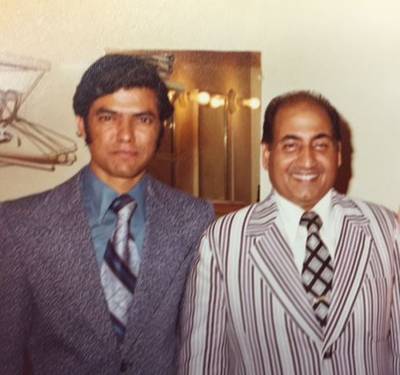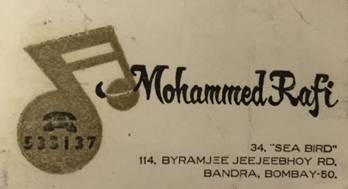Remembering the Greatest Muslim Singer in History, Mohammed Rafi
By Rafique Ahmed
Los Angeles, CA
July 31, 1980 was the saddest day in the world of music when the greatest Muslim singer, Mohammed Rafi had a massive heart attack and abruptly died in Mumbai, India leaving billions of his fans worldwide in a state of shock, disbelief and mourning. He was only 55 years of age and had recorded the last song of his life only a day before his death. Ironically the lyrics of his last song were, 'Tukahinaaspaashai dost' for the film "AasPaas".
Luckily I had the privilege and the opportunity of not only meeting and taking care of Mohammed Rafi, but also interviewing him backstage during his two concerts in Los Angeles, California in the 1970's. Most of the promoters in Los Angeles at that time were my good friends who used to delegate the most sensitive responsibility of taking care of all participating artists backstage to me during concerts. For several years, I not only met and interviewed a large number of superstars, singers and qawwals from both India and Pakistan, but also recorded their concerts directly from the amplifier backstage without any noise from the audience. That is quite a treasure with unforgettable memories.
Mohammed Rafi had always been my favorite singer since my childhood . Ever since I woke up very early in the morning, the ever smiling face of a down-to-earth, gentle, extremely humble, soft spoken and a great human being known as Mohammed Rafi had constantly been in my thoughts. Somehow, from the bottom of my heart, I feel compelled today to write about Rafi who ruled the Bollywood playback singing arena like a King for over 35 years and would continue to do so for many, many years after his death. Mohammed Rafi still is, and will remain, the greatest and extremely popular Indian Bollywood singer of all times. He had the rare combination of humility and greatness which is not to be found anymore. Singers will come and go but there cannot be another Mohammed Rafi. As LataMangeshkar, Bollywood female singing legend once said, 'Singers like Rafi Sahib are born once in a lifetime'.

|
Rafique Ahmed with Mohammed Rafi during a concert in Los Angeles in 1974 |
Mohammed Rafi was born on December 24, 1924 in village KotlaSultanpur of Amritsar and was the second of six sons born to Haji Ali Mohammed. The family moved to Lahore in 1935 and settled down in Noor Mohalla in Bhatti Gate. Mohammed Rafi loved singing since his childhood and was deeply influenced by a beggar and started singing publicly by imitating the chants of that beggar on the streets in the neighborhood. When he was 15, he got a rare opportunity to sing in front of a big crowd. He had gone to listen to his idol, K. L. Saigal who was scheduled to perform locally in Lahore. Unfortunately, there was a power outage in the auditorium. K.L. Saigal refused to sing without the microphone. The auditorium was packed with people who were going crazy for Saigal. Mohammed Rafi was accompanied by his older brother who requested the organizers to let Rafi sing until the power came back. The organizers agreed and let Rafi sing. Rafi, who had launched his singing career at Radio Lahore a short while ago, gave his first outstanding public performance and kept entertaining the audience until the power came on.
K.L. Saigal was also listening to Mohammed Rafi; he was visibly impressed and predicted that Mohammed Rafi was destined for bigger things. The 15 years old kid, Rafi, got a standing ovation from the audience which also included Music Director Shyam Sunder who was so impressed that he offered and made Mohammed Rafi a playback singer for the first time in the Punjabi movie, Gul Baloch, released in 1944. Because of the tremendous opportunities in Mumbai for the talented Mohammed Rafi, the family was convinced to let Mohammed Rafi move to Mumbai for his future success. He moved there for good in 1944 and the rest is history.
Mohammed Rafi learnt classical music from Ustad Abdul Wahid Khan, PanditJiwan Lal Mattoo and FirozeNizami. He used to practice (riyaz) daily without fail. Mohammed Rafi was a versatile singer famous for his songs ranging from classical numbers to patriotic songs, sad lamentations to highly romantic numbers, qawwalis, ghazals and bhajans. He was known for his ability to mold his voice to the persona of the actor, lip-synching the song. Between 1950 and 1970, Rafi was the most sought after singer in the Indian film industry. He received six Filmfare Awards and one National Film Award. In 1967, he was honored with the Padma Shri award by the Government of India. In 1948, Rafi received a silver medal from the Indian Prime Minister Jawaharlal Nehru, on the first anniversary of the Indian Independence Day. In 1974, Rafi won the Film World magazine Best Singer Award for the song "TereeGaliyon Mein Na RakhengeQadamAajKeBaad".
Mohammed Rafi adapted his singing style to the changing music styles of different decades. From classical renditions for music director Naushad, in the fifties, to folk melody based songs of music director S. D. Burman, in the sixties and seventies, from the foot tapping numbers of O. P. Nayyar to the musical scores of Shankar Jaikishan and so many others, he sang all songs with equal elan.
According to Rafi himself, he had sung about 25,000 to 26,000 songs during his singing career,

|
I had an open invitation from Mohammed Rafi to visit him in Bombay, but alas, it did not materialize due to time constraints |
Mohammed Rafi was a devout Muslim, he never smoked or drank alcohol. A family man, his daily routine would be a commute from home to the recording studio and back. Musical parties were a no-no for him while the early morning hours every daymwere spent in musical practice.
He loved playing badminton, flying kites and playing carom with his children.
My interesting observations of Mohammed Rafi backstage include:
- Mohammed Rafi was extremely soft spoken and a very quiet person. I had to initiate all the talking. He did respond to all my questions very professionally and gently, but briefly.
- He was extremely cautious about his appearance in public. Whenever he went on the stage, I noticed he always took his comb out of his pocket and used to comb his hair which were almost non-existent.
- He used to control the high and low pitch of his singing with his shoulders unlike so many other singers who use their hands for high or low pitch of their singing.
Mohammed Rafi died at 10:25 PM on 31 July 1980, following a massive heart attack. Rafi was buried at the Juhu Muslim cemetery. His was one of the biggest funeral processions Mumbai had ever witnessed, with over 10,000 people attending. The government of India had announced a two-day public holiday in honor of him.
Mohammed Rafi was a very generous and caring person. After every Friday prayers, he used to hand out a great number of envelopes with cash inside to beggars and other needy people at the mosque. Hundreds of beggars had cried on his death saying, "We became orphans today ."
-----------------------------------------------------------------------------

